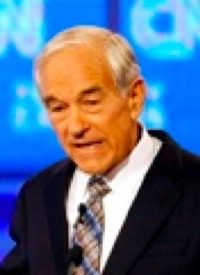
When a Tea Party member asked a question about whether the Federal Reserve should be audited, Paul was not asked to comment on the question. Paul is the author and primary sponsor of the main Federal Reserve Audit bill, the Federal Reserve Transparency Act (H.R. 459) in the House. His son, Senator Rand Paul (R-Kentucky) is the sponsor of the Senate version of the bill (S. 202). Paul's bill won every House Republican and many Democrats as co-sponsors during the last Congress, and he has 176 co-sponsors for his bill thus far in the current Congress, including fellow presidential candidate Michele Bachmann of Minnesota.
Most of the candidates criticized the Federal Reserve during the debate, even former Federal Reserve official Herman Cain, who favors the audit and says Fed Chairman Ben Bernanke should be fired. However, only Paul has called for the eventual abolition of the Federal Reserve Bank. Former Massachusetts Governor Mitt Romney told the Tea Party audience the nation needs the Fed because "if we don't have a Fed, who's going to run our currency? Congress? I don't want that." Of course, Article I, Section 8 of the U.S. Constitution stipulates that Congress alone must "coin money [and] regulate the value thereof," so calling for taking the power away from Congress is actually a direct attack on the Constitution.
Ron Paul campaign staffer Jack Hunter quipped about Paul being skipped over on the debate question:
You know Ron Paul is winning when everyone is asked about the Federal Reserve — while trying to sound exactly like the Texas Congressman — except the one man responsible for bringing this issue to the table in the first place.
Rep. Paul was asked to comment during the debate on healthcare, a topic the only medical doctor in the race has been passed over for comment in past debates. (Paul is an obstetrician and Duke University Medical School graduate who delivered more than 4,000 babies.) Asked by CNN anchor Wolf Blitzer about whether he would allow a hypothetical healthy 30-year-old man not to purchase health insurance, Paul responded: "That's what freedom is all about, taking your own risks."
Blitzer pressed further, asking a hypothetical situation where the same man got sick and needed care for six months without health insurance. The CNN host asked who would pay for the care: "Are you saying that society should just let him die?"
Paul responded from practical experience and defended free markets in medical care:
"No. I practiced medicine before we had Medicaid, in the early 1960s when I got out of medical school. I practiced at Santa Rosa Hospital in San Antonio. And the churches took care of them. We never turned anybody away from the hospital, and we've given up on this whole concept that we might take care of ourselves, assume responsibility for ourselves, that our neighbors, our friends, our churches would do it. And that's the reason the cost is so high. The cost is so high because we dump it on the government, it becomes a bureaucracy, it becomes a special interest, it cowtows to the insurance companies and to the drug companies."
Photo of Ron Paul: AP Images
Related articles:
Rick Perry Defends Legislating by Executive Order, Ron Paul Condemns
Why Do They Hate Us? Santorum: We’re Free; Paul: We’re There

